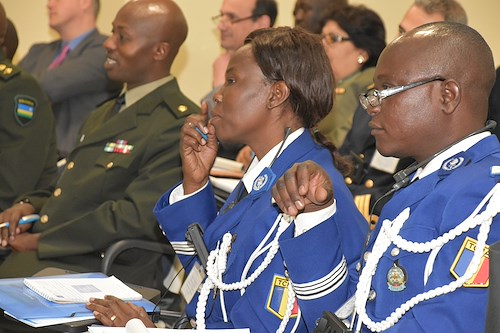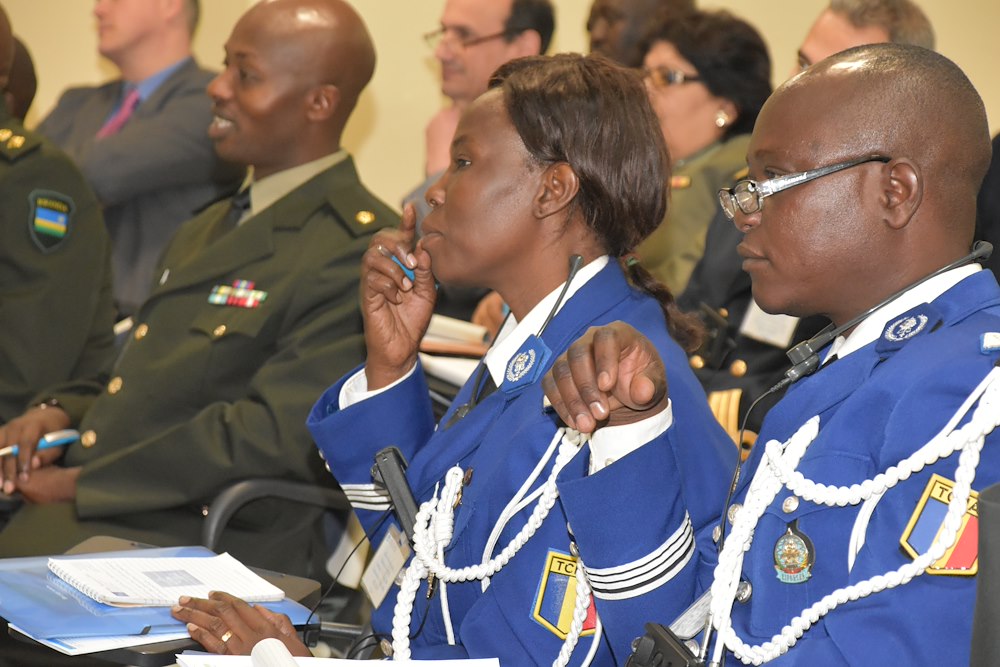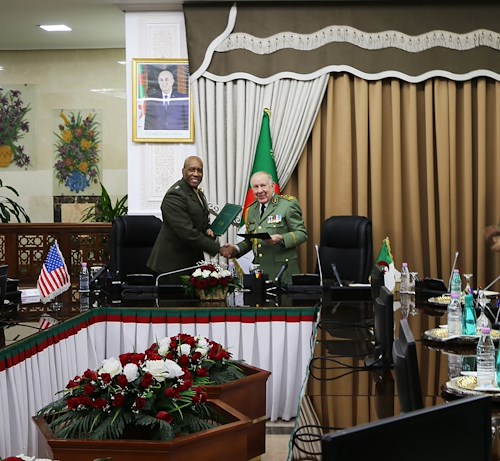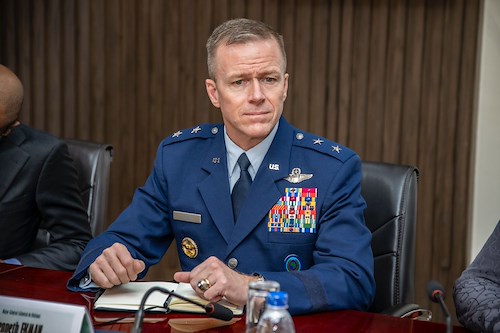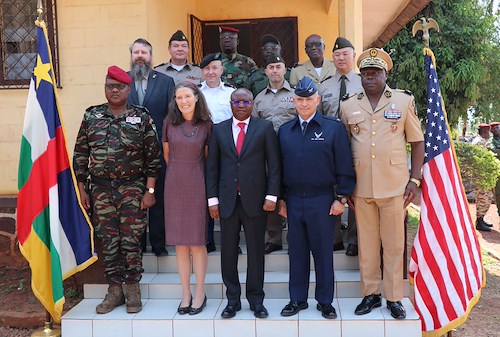Gallery contains 6 images
×
Photo 1 of 6
AFRICOM develops new tool to measure progress of Women, Peace, and Security
Commandant Ngarhordje Dedjiri and her colleague from Chad hear opening comments at the U.S. AFRICOM's Fourth Africa Accountability Colloquium (ACIV) on “Responding to Gender Based Violence During Peace Operations.” Nearly 40 military legal professional and commanders from 20 African countries have come together in an effort to lay the foundation for responding to sexual violence allegations that occur during peacekeeping operations. The annual event is once again being hosted by the International Institute of Humanitarian Law (IIHL) in Sanremo, Italy, Mar. 1-3, 2016. (U.S. Africa Command photo by Brenda Law/RELEASED)
Photo by: Brenda Law and Cori Fleser
Photo 2 of 6
AFRICOM legal engagement brings attention to gender based violence
Former African Union Mission in Somalia (AMISOM) Commander, Maj. Gen. Fred Mugisha draws an African spear as an analogy to describe the challenge of executing peace operations where multiple systems of law are in use, and soldiers require the support of their command in confronting extraordinary logistical challenges." Mugisha delivered the keynote address at the U.S. AFRICOM’s Fourth Africa Accountability Colloquium (ACIV) on “Responding to Gender Based Violence During Peace Operations.” Nearly 40 military legal professional and commanders from 20 African countries have come together in an effort to lay the foundation for responding to sexual violence allegations that occur during peacekeeping operations. The annual event is once again being hosted by the International Institute of Humanitarian Law (IIHL) in Sanremo, Italy, Mar. 1-3, 2016. (U.S. Africa Command photo by Brenda Law/RELEASED)
Photo 3 of 6
AFRICOM develops new tool to measure progress of Women, Peace, and Security
Cynthia Petrigh, from Beyond Peace, discusses gender based violence at U.S. AFRICOM’s Fourth Africa Accountability Colloquium (ACIV) on “Responding to Gender Based Violence During Peace Operations.” Nearly 40 military legal professional and commanders from 20 African countries have come together in an effort to lay the foundation for responding to sexual violence allegations that occur during peacekeeping operations. The annual event is once again being hosted by the International Institute of Humanitarian Law (IIHL) in Sanremo, Italy, Mar. 1-3, 2016. (U.S. Africa Command photo by Brenda Law/RELEASED)
Photo by: Brenda Law and Cori Fleser
Photo 4 of 6
AFRICOM legal engagement brings attention to gender based violence
Group photo of participants of the U.S. AFRICOM’s Fourth Africa Accountability Colloquium (ACIV) on “Responding to Gender Based Violence During Peace Operations.” Nearly 40 military legal professional and commanders from 20 African countries have come together in an effort to lay the foundation for responding to sexual violence allegations that occur during peacekeeping operations. The annual event is once again being hosted by the International Institute of Humanitarian Law (IIHL) in Sanremo, Italy, Mar. 1-3, 2016. (U.S. Africa Command photo by Brenda Law/RELEASED)
Photo 5 of 6
AFRICOM legal engagement brings attention to gender based violence
Deputy Chief of Legal Services for the Uganda Peoples’ Defence Forces, Col. Godard Busingye, (left), and President of the International Institute of Humanitarian Law (IIHL), Prof. Fausto Pocar at the U.S. AFRICOM’s Fourth Africa Accountability Colloquium (ACIV) on “Responding to Gender Based Violence During Peace Operations.” Nearly 40 military legal professional and commanders from 20 African countries have come together in an effort to lay the foundation for responding to sexual violence allegations that occur during peacekeeping operations. The annual event is once again being hosted by the International Institute of Humanitarian Law (IIHL) in Sanremo, Italy, Mar. 1-3, 2016. (U.S. Africa Command photo by Brenda Law/RELEASED)
Photo 6 of 6
AFRICOM legal engagement brings attention to gender based violence
Legal Counsel to the Commander, U.S. Africa Command, U.S. Marine Col. Donald Riley delivers comments at AFRICOM’s Fourth Africa Accountability Colloquium (ACIV) on “Responding to Gender Based Violence During Peace Operations.” Nearly 40 military legal professional and commanders from 20 African countries have come together in an effort to lay the foundation for responding to sexual violence allegations that occur during peacekeeping operations. The annual event is once again being hosted by the International Institute of Humanitarian Law (IIHL) in Sanremo, Italy, Mar. 1-3, 2016. (U.S. Africa Command photo by Brenda Law/RELEASED)
STUTTGART, Germany - Rana’s story
When the conflict reached our village, my parents and I went hiding in the bush. Armed men found us. I was the only young woman in the group, and still a virgin. There were 10 armed men, of whom four were child soldiers.
They were wearing balaclavas. They wanted to take me with them. My mother begged them to let me alone because I am her only child.
The men sent my parents away at the point of their AK-47.
The 10 of them raped me. They were queuing, watching while I was raped in the vagina and the anus. Some of the child soldiers were not even 15. My parents could over-hear everything and were crying, powerless.
In spite of the care provided by my mother, I was bleeding from the vagina and the anus for three days. I could not control my bladder nor my intestines because they were torn.
After the armed men left and we returned to the village, my life became a nightmare. People kept away from me because they said I was smelly; I have nightmares and I think of committing suicide.
Rana’s story is tragic because it happens all too often, even when peacekeeping troops have been sent to a conflict area to protect people like Rana. Sometimes the perpetrators have actually been the peacekeeping troops.
Each year the U.S. Africa Command Office of Legal Counsel conducts the African Accountability Colloquium - a legal engagement that brings together legal professionals from African militaries to discuss and develop policy and processes on various rule of law issues.
Responding to gender based violence during peacekeeping operations (PKOs) was the focus for this year’s colloquium, hosted at the International Institute of Humanitarian Law (IIHL) in San Remo, Italy, Mar. 1-3.
Deputy Chief of Legal Services for the Uganda Peoples’ Defence Forces, Col. Godard Busingye, served as the course director, and was the one who initially proposed the topic when approached by AFRICOM to serve as the Director of the Colloquium.
“Our goal is to lay a foundation within a legal framework on how to address sexual and gender based violence (SGBV) during peacekeeping operations,” said Busingye. “AACIV builds on the momentum gained in the previous three African Accountability Colloquia and maintains an African focus on issues relevant to the African militaries.”
As course director, Busingye worked closely with the team of AFRICOM Legal Engagements, lead by U.S. Coast Guard Cdr. Trent Warner, and IIHL to develop the three-day agenda and finalize a list of presenters acknowledged as experts in the SGBV arena.
“Last year was the third colloquium but it was the first time we had commanders here with their legal advisors,” said Warner. “It was so successful that we incorporated that element into the makeup of participants, so for this fourth colloquium half of the participants are African military legal professionals and the other half are commanders.
“So the purpose was to bring the two essential components together who ensure the rule of law in military operations, that is, the decision makers in the commanders, and the individuals who are going to give them legal advice.
“It’s important that that legal advice get to commanders in a timely manner. So what that means is they receive that advice in the planning process of an operation, during execution of that operation as well as after,” said Warner.
In regards to missions, Warner said that frequently commanders seek legal assessments only after an operation. This can create significant challenges in particular for those commanders who are preparing to deploy on a peacekeeping mission.
“What we’re trying to do here is inculcate into the commander’s thinking the necessity to bring in their legal advisor early on in the process of planning an operation and have them connected throughout,” said Warner. “The Africans asked that gender based violence be the focus of this year's colloquium and together we’ve created an agenda that discusses critical aspects for what we hope will better prepare commanders who will take on peacekeeping missions.”
Defining standards
Throughout the three day forum and central to addressing issues was the discussion and debate of defining standards. What is sexual and gender based violence? What actually constitutes a violation? Who’s responsible when a peacekeeping troop is accused? What happens after an allegation of SGBV is reported? Whose duty is it to investigate? What about “trading sexual favors for food? What constitutes sexual exploitation and abuse (SEA)?
Experts sharing experiences
The agenda featured commanders experienced in leading peacekeeping missions, such as former African Union Mission in Somalia (AMISOM) Commander, Maj. Gen. Fred Mugisha, a member of the Uganda Peoples Defence Force High Command. Mugisha delivered the keynote speech in which he discussed some of the challenges commanders can face in highly complex conflict areas.
“In trying to enforce a standard,” said Mugisha, “one must understand that in the conflict area there are likely already in place different groups observing different laws, and bringing in yet a new standard can make your job as commander of a peacekeeping mission even more challenging because you must take these other perspectives of laws into consideration.”
Another veteran commander of peacekeeping missions, Maj. Gen. George Owinow who currently serves as the commandant of the Kenya Military Academy, discussed his experiences and said that leaders must look for ways to reduce the risk of SGBV, such as shortening tours of duty.
Among the presenters was Ms Cynthia Petrigh, an acknowledged international expert with more than 20 years experience of intervention in conflict and post-conflict situations. Petrigh is an oft requested presenter at the IIHL and had presented previously at the Colloquia. This was welcome, as Busingye had been impressed by a presentation he heard her deliver at the UN a year ago."
Petrigh, who is French, started a human rights company in 2012 called Beyond Peace and soon after went to Mali to provide SGBV training to 2,700 soldiers before they deployed on missions.
“I’ve not just raised awareness among commanders,” said Petrigh “I’ve trained soldiers, too. The feedback I received from the Malian troops was so positive, they returned from their missions saying, ‘Because we knew how to better protect the people, and especially the women and children, they trusted us more, and they were more willing to give us information – the intelligence we needed to get our job done,’ so now they could see the benefit of this training.”
In a presentation on investigation challenges, Petrigh teamed with the current Provost Marshal of AMISOM, Maj. Desire Hakorimana of the Burundian Army, and Ms Thembile Segoete from Lesotho, a career prosecutor who currently serves on the International Criminal Tribunal for Rwanda.
As having commanders participate in the previous colloquium was a first, a first at the fourth colloquium was to have presentations in French as well as English. Since participants represented a near equal mix of native speakers for both languages, this greatly increased debate and interaction throughout the forum.
Helping to facilitate engagement with French speakers was AFRICOM legal engagement team member U.S. Army Reserve Lt. Col. Gisela Westwater who served as facilitator during group breakouts and the table top exercise of SGBV scenarios. Westwater, who lived in Cote d’Ivorie for two years as a Peace Corps volunteer, also served as a reservist in Mali for one year when she was assigned to the U.S. Embassy in Bamako.
Facilitating the English breakout groups along with Warner was Ms Sandra Franzblau, AFRICOM’s subject matter expert for insuring the command’s joint and combined exercise program with African militaries addresses rule of law issues.
“As course director, it was important to me that we draw on the experience of African military commanders who’ve lead peacekeeping missions,” said Busingye, “as well as internationally recognized experts on SGVB. These experts, combined with the expertise of the AFRICOM legal engagements team and the IIHL staff lead by British Army Col. John Hardy has made this a very robust learning environment for all.”
Way Forward
Busingye emphasized that a way forward should involve staying connected and keeping the dialogue going in a direction that leads to specific outcomes such as scenario-based training in SGBV similar to what was used in the colloquium for troops before they deploy on PKOs, getting commanders connected to their legal advisors in all stages of PKOs, and including a victim assistance component in PKOs.
Doing this, Busingye said, would help formulate appropriate courses of action in the context of any particular mission’s mandate and rules of engagement, and thereby enable commanders for success in PKOs in providing a force that truly protects the civilian populations they are charged with keeping safe.
Ultimately, and it may take a long time considering the differing cultures and the nature of conflict, the outcomes of this particular colloquium is to enable commanders of peacekeeping missions to ensure stories like Rana’s won’t happen in future peacekeeping operations.
For more photos of the Fourth African Accountability Colloquium hosted at the IIHL in San Remo, Italy, click here.

